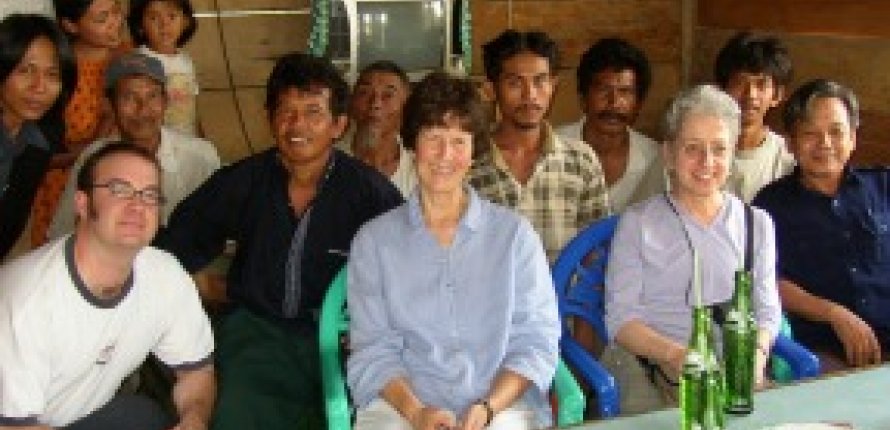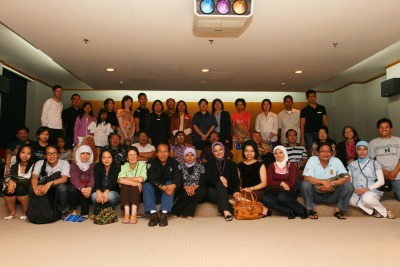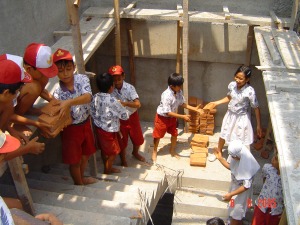New Challenges and Ways of Seeing the World

Elizabeth Collins, Fulbright Ambassador
Professor, Department of Classics and World Religions at Ohio University
September-December 2002 Fulbright Scholar to Indonesia
In 1994, I was interviewing student leaders and activists in the Legal Aid Society (LBH)  and environmental NGO WALHI in South Sumatra for my book, Indonesia Betrayed: How Development Failed. By 1997, the activists were caught up in the pro-democracy movement that brought down the New Order of General Suharto a year later. Their excitement and hope for change was contagious, and I realized that my book needed a broader focus. When I became eligible for sabbatical, I applied for a Fulbright grant that would allow me to see whether ‘development’ projects were improved by more democratic and decentralized governance. In 2002-2003, I returned to South Sumatra and reached out to my old contacts. Soon NGO activists began gathering at my house in Palembang. We interviewed farmers involved in land conflicts with palm oil companies, people facing pollution from a pulp and paper factory owned by an international corporation, and newly elected district and provincial officials.
and environmental NGO WALHI in South Sumatra for my book, Indonesia Betrayed: How Development Failed. By 1997, the activists were caught up in the pro-democracy movement that brought down the New Order of General Suharto a year later. Their excitement and hope for change was contagious, and I realized that my book needed a broader focus. When I became eligible for sabbatical, I applied for a Fulbright grant that would allow me to see whether ‘development’ projects were improved by more democratic and decentralized governance. In 2002-2003, I returned to South Sumatra and reached out to my old contacts. Soon NGO activists began gathering at my house in Palembang. We interviewed farmers involved in land conflicts with palm oil companies, people facing pollution from a pulp and paper factory owned by an international corporation, and newly elected district and provincial officials.
I also taught at the National Islamic University in Jakarta for the first six months of my Fulbright. This was in response to a request from the Rector, Pak Azyumardi Azra, a scholar and engaged intellectual who was a leader of the movement to promote more liberal interpretations of Islam in Indonesia. The teaching proved to be a fantastic opportunity to learn about the political views of Islamic student activists. When the Bali bombing happened in October 2002, my students were convinced the CIA was involved. Their sources of information were extremist websites and Sabili, a magazine promoting jihad. Together we explored biases in both Western and Islamic media, and I learned at least as much as my students did. When I returned to Ohio University I was able to integrate new perspectives on Islamism into my teaching.
D uring my Fulbright year, I also continued to work with Yaysan Nurani Dunia (YND). After violent conflicts broke out between Muslims and Christians in eastern Indonesia in 1999, Imam Prasodjo, a professor at Universitas Indonesia and former Fulbright grantee in the United States, invited me to go to Buton in 2000 to report on refugees from the conflict. Inspired by what we saw there, we formed YND using existing networks of activist students to get aid to victims quickly and directly. YND has now rebuilt more than 15 schools in conflict areas and in parts of Aceh devastated by the 2004 tsunami. Students from Ohio University have gone to work as volunteer interns at Nurani Dunia and Indonesian students at OU have raised money for YND projects. My work with Imam Prasodjo also led to a successful application for a Ohio University-Universitas Indonesia partnership grant from the U.S. Department of State for training-of-trainer workshops on conflict management and democratic dialogue.
uring my Fulbright year, I also continued to work with Yaysan Nurani Dunia (YND). After violent conflicts broke out between Muslims and Christians in eastern Indonesia in 1999, Imam Prasodjo, a professor at Universitas Indonesia and former Fulbright grantee in the United States, invited me to go to Buton in 2000 to report on refugees from the conflict. Inspired by what we saw there, we formed YND using existing networks of activist students to get aid to victims quickly and directly. YND has now rebuilt more than 15 schools in conflict areas and in parts of Aceh devastated by the 2004 tsunami. Students from Ohio University have gone to work as volunteer interns at Nurani Dunia and Indonesian students at OU have raised money for YND projects. My work with Imam Prasodjo also led to a successful application for a Ohio University-Universitas Indonesia partnership grant from the U.S. Department of State for training-of-trainer workshops on conflict management and democratic dialogue.
Since I began my research in Indonesia more than ten years ago, several of the activist students I worked with in South Sumatra have gone on to graduate work outside of Indonesia. Two completed MA degrees at Ohio University and now work on economic justice issues for the UNDP and as consultants for INGOs. Another has an advanced degree from Korea and serves on the National Human Rights Commission. A fourth started the first Women’s NGO in South Sumatra, which has a safe house and runs anti-rape workshops. Another earned a Ph.D. at Ohio University and is now a consultant on gender programs for the United Nations. Several students from the National Islamic University also came to OU. They have since returned to teach there. We jokingly call our community of Indonesian OU alumni the ‘OU Mafia,’ boasting 93 members on Facebook. To have worked with these Indonesian activists and see the results of their commitment to making Indonesia more democratic has been one of the best experiences of my life.
